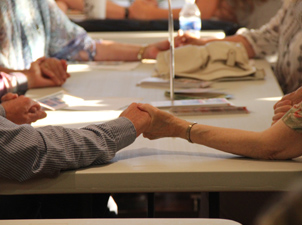
Peacebuilding in Polarized Times
Claire Guinta
March 15, 2018
In February, Sister Simone came to Marquette University to speak about “21st Century Poverty and the Challenge of Healing Our Nation.” Hearing about current divisions in our country, it struck me how connected polarization is to the isolation between different economic groups and the assumptions we make of “the other.”
During her talk I thought of isolation I see around me. I am a senior at Marquette, a Jesuit University that “strives to develop men and women who will dedicate their lives to the service of others, actively entering into the struggle for a more just society.” Yet, through perceptions of poverty and violence, there is often an “othering” of those who live in the Milwaukee neighborhoods directly surrounding my campus. These assumptions create barriers between us in the “bubble” and those living just a few blocks away.
“Individualism and polarization are driving us apart because we don’t know each other’s stories,” Sister Simone Shared, “And we don’t see this. So, what do we do?”
She proposed four simple ways each of us can be a part of revitalizing community and reclaiming hope:
- Virtue of curiosity: Have a holy curiosity to build community with folks we don’t know. Listen to other people’s stories.
- Virtue of sacred gossip: Share those stories that you discovered. It brings us together and spreads knowledge.
- Virtue of joy: Joy is in the relationship, joy is in the discovery, joy is in being woven together in community.
- Virtue of doing your part: Don’t try to do it all—we are all one part of the body.
Through my own journey I have seen how these virtues can transform an individual and a community. As a research assistant with the Marquette University Center for Peacemaking, I went door-knocking in the neighborhoods surrounding campus to collect survey data used to inform community initiatives. My first day door-knocking, I stepped onto the streets that had been described like the “shadowland from the Lion King.” I wrestled with that image in my head and tried to leave my assumptions behind. Quickly, I realized that the neighborhoods surrounding my campus were home to a diverse group of people (racially, economically, religiously, culturally). People were excited to share their opinions about their community and ready to see new community initiatives. When Sister Simone said that “hope is a communal virtue,” I thought of the people I met door-knocking.
When I returned to campus, I shared the survey results with the data team, but I also shared their stories with my friends. I found joy in making the connection with the neighborhood residents, but also in sharing what I had learned. It didn’t solve any headlining issues, but I was a part of a team working to revitalize a community. By making connections with “the other,” my assumptions faded away and were replaced by stories.
So, when I approach peacebuilding in these polarized times, I will be sure to have some holy curiosity, engage in sacred gossip, practice the virtue of joy, and seek out how I fit in to the greater picture.
Glaire Guinta is a senior at Marquette University in Milwaukee, Wisconsin where she studies International Affairs, Spanish, and Peace Studies. Throughout her university career, Claire has been involved in various activities supporting immigrants and refugees, including trips to the borderlands and providing interpretation services in Milwaukee. She currently works at the Marquette University Center for Peacemaking.







